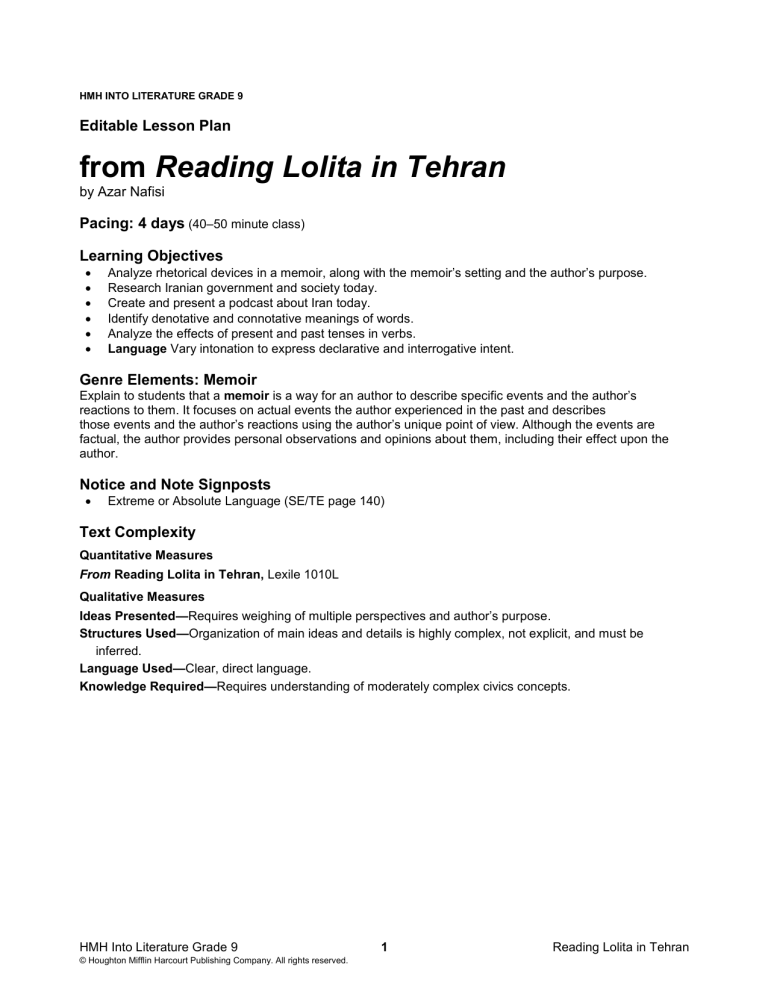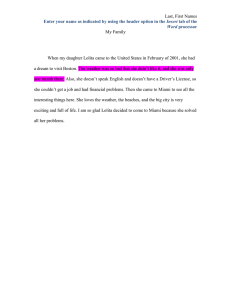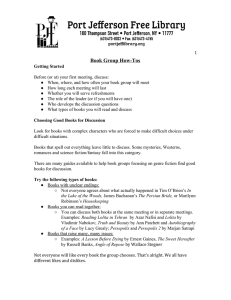
HMH INTO LITERATURE GRADE 9 Editable Lesson Plan from Reading Lolita in Tehran by Azar Nafisi Pacing: 4 days (40–50 minute class) Learning Objectives Analyze rhetorical devices in a memoir, along with the memoir’s setting and the author’s purpose. Research Iranian government and society today. Create and present a podcast about Iran today. Identify denotative and connotative meanings of words. Analyze the effects of present and past tenses in verbs. Language Vary intonation to express declarative and interrogative intent. Genre Elements: Memoir Explain to students that a memoir is a way for an author to describe specific events and the author’s reactions to them. It focuses on actual events the author experienced in the past and describes those events and the author’s reactions using the author’s unique point of view. Although the events are factual, the author provides personal observations and opinions about them, including their effect upon the author. Notice and Note Signposts Extreme or Absolute Language (SE/TE page 140) Text Complexity Quantitative Measures From Reading Lolita in Tehran, Lexile 1010L Qualitative Measures Ideas Presented—Requires weighing of multiple perspectives and author’s purpose. Structures Used—Organization of main ideas and details is highly complex, not explicit, and must be inferred. Language Used—Clear, direct language. Knowledge Required—Requires understanding of moderately complex civics concepts. HMH Into Literature Grade 9 © Houghton Mifflin Harcourt Publishing Company. All rights reserved. 1 Reading Lolita in Tehran Selection Summary Azar Nafisi describes conditions for women in Tehran after the Iranian Revolution of the 1970s. Nafisi secretly teaches a literature class for women in her home and illustrates the repressive restrictions on women’s appearance and their public conduct by imagining what it’s like for one of her students to travel across Tehran after leaving Nafisi’s house. Nafisi explores the woman’s thoughts as well as the cultural demands on her—and the dangers she faces. Selection Vocabulary segregate v. to cause people to be separated based on gender, race, or other factors. allocate v. to assign or designate for. convert v. to change one’s system of beliefs. irrelevant adj. insignificant, unimportant. HMH Into Literature Grade 9 © Houghton Mifflin Harcourt Publishing Company. All rights reserved. 2 Reading Lolita in Tehran Instructional Focus (select your resources) Reading Informational Text Speaking and Listening ☐ Analyze Rhetorical Devices (SE/TE page 137 and 141) ☐ Analyze Setting and Purpose (SE/TE pages 137 and 140) ☐ Compare Across Genres (SE/TE page 154) ☐ Present to a Small Group (SE/TE page 143) Vocabulary/Language ☐ Denotative and Connotative Meanings (SE/TE page 144) ☐ Verb Tense (SE/TE page 145) Writing and Research Formative Assessment ☐ Create a Podcast (SE/TE page 143) ☐ Research Changes in the Iranian Government (SE/TE page 142) ☐ Check Your Understanding (SE/TE page 141) Additional Resources for Instruction, Practice, & Assessment (select your resources) ☐ Digital eBook ☐ Response Log for Unit 2 ☐ from Reading Lolita in Tehran/from Persepolis 2 Selection Test (Summative Assessment) ☐ Selection Audio ☐ Peer Coach: Analyze Author’s Purpose; Analyze Rhetoric ☐ Anchor Chart (in English and Spanish): Analyze Author’s Purpose; Analyze Rhetoric ☐ Reading Studio: Notice & Note ☐ Speaking and Listening Studio: Using Media in a Presentation ☐ Vocabulary Studio: Denotative and Connotative Meanings ☐ Grammar Studio: Module 6: Lesson 3: Verb Tense ☐ Spanish Resources (Spanish Summary and translated Selection Vocabulary and Unit Academic Vocabulary ☐ Multilingual Glossary Resources for Pre-AP/Honors Programs Use the following selection-aligned resources to support your Pre-AP/Honors program. Preview and select High-DOK post-reading questions and activities. (TE pages 142–143) Dig deeper into the topic with an “Connect” activity for the post-reading Research project (SE page 142) Build toward an alternative end-of-unit task with Media Projects: “Create a Protest Song.” (available online) Challenge students with HMH Leveled Text by selecting additional, unit-aligned readings at stretch Lexile levels (available online) Connect the conversation to today with HMH Current Events connections. (available online) Review point-of-use “To Challenge Students” notes in the Teacher’s Edition, to implement more advanced in-class activities. HMH Into Literature Grade 9 © Houghton Mifflin Harcourt Publishing Company. All rights reserved. 3 Reading Lolita in Tehran Support and motivate your students with Writable through the HMH Ed platform. Writable is an online writing tool that features: assignable writing tasks for all selections in Into Literature a bank of more than 600 customizable, standards-aligned writing prompts peers review and revision tracking interactive grading rubrics AI feedback with RevisionAid originality checking with TurnItIn Google Docs integration and data-driven reports for deeper insight into student performance Writable can help you prepare your students for the end-of-unit writing task with this Writable-exclusive assignment. Compare-and-Contrast Analysis: Organization In this assignment, students read excerpts from Azar Nafisi’s memoir Reading Lolita in Tehran, and Marjane Satrapi’s graphic memoir Persepolis 2: The Story of a Return, which depict the difficulty of women’s lives under the oppressive regime in Iran. They write a four-paragraph Compare-and-Contrast Analysis, exploring the similarities and differences between the depiction of women's lives and the formats (text memoir vs. graphic memoir). Students focus on using a clear and logical organizational structure and on using transitions to connect their ideas, both important skills for the end-of-unit Research Report, and for writing in the Information genre in general. Duration: 30–45 minutes Skills (8): Use Transitions to Connect Ideas, Organize for Flow & Logic, Provide Closure, Connect Ending, Introduction & Conclusion, Use Transitions, Connect Ideas, Organize Ideas Rubrics: Writable HS Format: Short Response Small Group Options (TE page 136B) Have students work in small groups to read and discuss the selection. Pinwheel Discussion Form groups of 6 (or 8), with 3 (or 4) students facing out, each paired with a partner facing in. Provide a question about the selection and have pairs discuss it for a prescribed time. Randomly call on pairs to summarize their discussion for the class and answer questions. Have students in the outer circle rotate one person to the right to form a new pair. Repeat the process so that all students work with all others. Possible questions: Why do you think Nafisi left Iran? Do you think the small acts of rebellion by women were effective? Think-Write-Pair-Share After students have read and analyzed the excerpt from Reading Lolita in Tehran, pose this question: Can restrictions like those used in Iran force people to change their opinions and attitudes? Why or why not? Have students think about the question individually and take notes. Then have pairs discuss their ideas about the question. Finally, ask pairs to share their responses with the class. HMH Into Literature Grade 9 © Houghton Mifflin Harcourt Publishing Company. All rights reserved. 4 Reading Lolita in Tehran Differentiated Instruction To Challenge Students … (Extension) (SE/TE page 155) Create a Unique Graphic Novel Encourage interested students to create a separate and unique graphic novel by choosing their own subject. They may choose a scene from a favorite book, focus on a favorite character, or create their own story or short novel. They may follow the steps outlined for the group or rely on their own creative process. For example, they might choose to write dialogue, captions, and thought balloons first and then work to illustrate the panels. Note that some graphic novels use almost no captions or words and rely on the illustrations to tell the story. Remind students that, as with any written or artistic work, they may need to create multiple versions and make many edits before achieving a final product. When Students Struggle … (Intervention) (SE/TE page 143) Create a Podcast Explain that an anecdote is a short, amusing, or interesting story about real events. Point out how an an anecdote can function in a presentation such as a podcast (hook the reader’s attention with a real story before presenting more general information). Explain that much of the excerpt from Reading Lolita in Tehran uses the anecdote of Sanaz’s imagined return home to draw and keep the reader’s attention. Help students identify anecdotes using these questions: What stories about real people have I found during research? Have I had an interesting experience related to the research, such as finding surprising facts? How have people’s lives changed in big or surprising ways during this period? Once a subject is established, coach students on presenting the information as a narrative story that will interest their listeners. HMH Into Literature Grade 9 © Houghton Mifflin Harcourt Publishing Company. All rights reserved. 5 Reading Lolita in Tehran English Learner Support INTRODUCE THE SELECTION Discuss Oppressive Regimes In this lesson, students will read about and discuss oppressive regimes. Explain the following terms: Oppressive is an adjective that refers to actions that prohibit people from speaking, acting, or thinking freely. A regime is a group that temporarily controls a government or organization. Explain that not all regimes are oppressive and that some regimes offer freedoms to their people. Provide these frames to prompt discussion about oppressive laws and changing regimes: The regime in the United States changes every ______ because of ______. Punishing people for ______ is oppressive. Cultural References The following words or phrases from the selection may be unfamiliar to students: It is in her best interest (paragraph 2): the results will be better for her white Toyota patrols (paragraph 2): a type of car used by Iranian militia to travel in the city squeezed together like sardines (paragraph 3): packed closely together like small fish in cans stoning (paragraph 4): an ancient type of punishment (sometimes fatal) in which a crowd attacks someone by throwing stones Listening Understand Important Ideas Use the following supports with students at varying proficiency levels: As you read aloud the Background paragraph, pause after each sentence and have students rephrase it to confirm their understanding. SUBSTANTIAL SUPPORT Encourage students to note any clarifying questions they have as you read the Background paragraph aloud. When complete, have students ask their questions to confirm understanding. MODERATE SUPPORT After you read the Background paragraph aloud, confirm students’ understanding by asking them to provide an oral summary statement of the paragraph. LIGHT SUPPORT Have partners read the Background paragraph aloud to each other by alternating sentences. Then ask them to work together to create summary sentences for the most important information. EXTENSION ACTIVITY HMH Into Literature Grade 9 © Houghton Mifflin Harcourt Publishing Company. All rights reserved. 6 Reading Lolita in Tehran Speaking Speak with Rhythm and Intonation On Student Edition page 143, students will be asked to create a podcast in which they read a script aloud. Help them practice English rhythms and intonation to gain confidence in speaking. Use the following supports with students at varying proficiency levels: Explain that English speakers often use a different rhythm and intonation for questions and declarative statements. Repeat the following question and response aloud and have students echo them, focusing on rhythm and intonation: How has Iran changed in recent years? It has changed in many ways. What is life there today like? I will do some research to find out. SUBSTANTIAL SUPPORT Ask students to say the following sentences aloud and assist them as necessary with rhythm and intonation: How has Iran changed in recent years? It has changed in many ways. What is life there today like? I will do some research to find out. MODERATE SUPPORT Have pairs write a question and a declarative statement about Iran and practice saying them aloud with proper rhythm and intonation. LIGHT SUPPORT Have students write three sentences about Iran, including one question. Ask them to read the sentences aloud with proper rhythm and intonation. EXTENSION ACTIVITY Reading Recognize and Analyze Rhetorical Questions Explain that this author uses rhetorical questions (questions that do not require or expect an answer) to direct the reader’s attention and to stir careful thought. Have students reread paragraph 4 and number the sentences in their consumable text. Then use the following supports with students at varying proficiency levels: Instruct students to identify the punctuation mark that indicates a question. Ask them to count up the number of sentences that are questions compared to the number of statements. SUBSTANTIAL SUPPORT Have students focus on the first four sentences. Ask: What answers does the author supply for the rhetorical question in sentence 2? MODERATE SUPPORT Point out that sentence 2 is a rhetorical question. Ask: What is the purpose of the questions in sentences 5–7? LIGHT SUPPORT Have students rewrite paragraph 4 using declarative sentences rather than rhetorical questions while providing the same information. Discuss the author’s purpose in using rhetorical questions. EXTENSION ACTIVITY Writing Use Varied and Complex Sentence Structures Explain that interesting podcasts use a variety of sentence structures. Provide practice using independent and dependent clauses to combine sentences before students complete the activity on Student Edition page 143. Use the following supports with students at varying proficiency levels: Provide assistance as necessary in combining the following sentences: Iran experienced a revolution in the late 1970s. It caused many changes. SUBSTANTIAL SUPPORT Ask students to combine these sentences using the modifier although: The government placed many restrictions on women. Many women rebelled against them. MODERATE SUPPORT Have students write two declarative sentences about Iran and then combine them into a complex sentence. LIGHT SUPPORT Have students write a paragraph about Iran using only simple sentences. Then have them rewrite HMH Into Literature Grade 9 © Houghton Mifflin Harcourt Publishing Company. All rights reserved. 7 Reading Lolita in Tehran it by combining some of the sentences into complex sentences to improve the flow of information. EXTENSION ACTIVITY Collaborate & Compare Once students have worked through both selections, have them work through the collaborative project on pages 154–155. Students should work together to answer the Analyze the Texts questions and then complete the project in a group. English Learner Support (page 154) Compare Selections Use these questions to help students compare the selections. 1. What method does Nafisi use to describe the limitations, or rules about, clothing and appearance? What method does Satrapi use to describe the same things? 2. What is the character Sanaz in Reading Lolita in Tehran doing as she walks down the street? What is the character in Persepolis 2 doing as she walks down the street? 3. What small, symbolic protests does Nafisi describe? What small, symbolic protests does Satrapi describe? MODERATE/LIGHT SUPPORT Assessment Formative Assessment Check Your Understanding (SE/TE page 141) Analyze the Text (SE/TE page 142) Analyze the Texts (SE/TE page 154) Summative Assessment “from Reading Lolita in Tehran/from Persepolis 2” Selection Test HMH Into Literature Grade 9 © Houghton Mifflin Harcourt Publishing Company. All rights reserved. 8 Reading Lolita in Tehran

